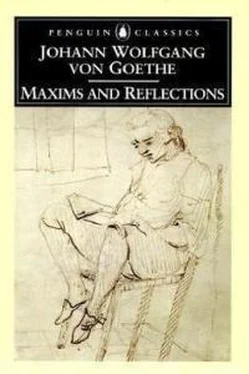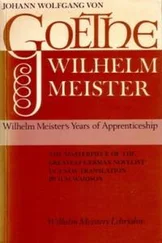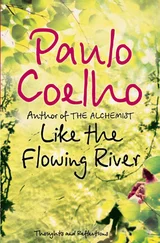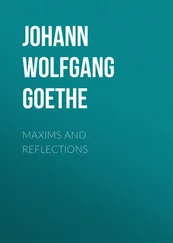Иоганн Гёте - Maxims and Reflections
Здесь есть возможность читать онлайн «Иоганн Гёте - Maxims and Reflections» весь текст электронной книги совершенно бесплатно (целиком полную версию без сокращений). В некоторых случаях можно слушать аудио, скачать через торрент в формате fb2 и присутствует краткое содержание. Год выпуска: 2015, Издательство: epubBooks Classics, Жанр: Публицистика, на английском языке. Описание произведения, (предисловие) а так же отзывы посетителей доступны на портале библиотеки ЛибКат.
- Название:Maxims and Reflections
- Автор:
- Издательство:epubBooks Classics
- Жанр:
- Год:2015
- ISBN:нет данных
- Рейтинг книги:5 / 5. Голосов: 1
-
Избранное:Добавить в избранное
- Отзывы:
-
Ваша оценка:
- 100
- 1
- 2
- 3
- 4
- 5
Maxims and Reflections: краткое содержание, описание и аннотация
Предлагаем к чтению аннотацию, описание, краткое содержание или предисловие (зависит от того, что написал сам автор книги «Maxims and Reflections»). Если вы не нашли необходимую информацию о книге — напишите в комментариях, мы постараемся отыскать её.
Maxims and Reflections — читать онлайн бесплатно полную книгу (весь текст) целиком
Ниже представлен текст книги, разбитый по страницам. Система сохранения места последней прочитанной страницы, позволяет с удобством читать онлайн бесплатно книгу «Maxims and Reflections», без необходимости каждый раз заново искать на чём Вы остановились. Поставьте закладку, и сможете в любой момент перейти на страницу, на которой закончили чтение.
Интервал:
Закладка:
Goethe is no exception to the rest of mankind in not being equally wise at all times, and in the maxims there are degrees of value: they do not all shine with the like brilliance. Some of them are valuable only for what they suggest; of some, again, it is easy to see that, they appear as matters of speculation rather than as certainties. They raise difficulties, ask for criticism, if possible, correction; or, it may be, they call attention to the contrary view and invite a harmony of opposites. Some of them make a great demand upon our ability "to understand a proverb and the interpretation; the words of the wise and their dark sayings." Their value sometimes depends on the way they are viewed, the culture brought to their understanding, the temper in which they are approached. We look at them, and at first admire; we change our point of view, and find something to criticise and dispute. The obscurity of maxims, as Goethe reminds us, is only relative; not everything can be explained to the reader which was present to the mind of the writer. Some of them seem at first to be of little interest; on one side they may even repel, but from another they attract again, and win perhaps a partial approval. They seem to move as we change our position, and to be without fixed or certain character. But some, again, are so clear and unmistakable, so immeasurably above criticism or objection, that like the furthest of the stars they have no parallax: whatever position we take, their light is steadfast.
Let no one suppose that in the main Goethe's reflections on life had never been made before; that it was not so, no one knew better than he. As a preface and note of warning to them all, he reiterates the words of the preacher: "there is no new thing under the sun." Yes! says Goethe, there is nothing worth thinking but it has been thought before; we must only try to think it again . "It is only when we are faithful," he says elsewhere, [2] Wilhelm Meisters Wanderjahre , Bk. I. ch. 10.
"in arresting and noting our present thoughts, that we have any joy in tradition; since we find the best thoughts already uttered, the finest feelings already expressed. This it is that gives us the perception of that harmonious agreement to which man is called, and to which he must conform, often against his will as he is much too fond of fancying that the world begins afresh with himself." What Goethe means is that we shall do best to find out the truth of all things for ourselves, for on one side truth is individual; and that we shall be happy if our individual truth is also universal, or accords with the wisest thought of the past. It is in this practical light that we must view the maxims, and not as mere academic generalities. It is easy to read them in an hour and forget them as soon; easy to view them with a tepid interest as the work of a great author; but no one will fully understand the value of any of them, who has not experience enough to know its truth. Well is it for us if with the experience we also gain the truth! If any one should say that some of these maxims are very obvious, and so simply true as almost to be platitudes, I would bid him remember that the best education is often to discover these very simple truths for oneself, and learn to see how much there is in commonplaces. For those who have grown old in the world are never weary of telling us that the further we go, the more we shall find, in general, that the same things will happen to us as have happened to others; and it will then be our advantage if we have the same reflections, best of all if we come of ourselves to the same conclusions, as the wisest of those who have gone before us; next best, if we can really and intelligently follow in the footsteps of their thought.
But although the matter of Goethe's sayings is not original in the sense of being new to the world—while it was original for him, since he discovered it for himself and on his own path, their manner is something new, and their range is unparalleled. Take any other set of maxims you will, nowhere is there so wide an outlook, nowhere so just an estimate of human difficulties, nowhere an aim at once so lofty and so practicable. Nowhere is there a larger, stronger, healthier, more tolerant view of life and the world, or an atmosphere clearer of the mists that too often obscure and distort our vision. And in their expression, nowhere is there so little of the besetting sin to sacrifice truth to effect. Goethe has none of the shallow malice and uncharitable candour that with writers of an earlier age passed for the practical wisdom of every day; and we need only contrast his maxims with the similar work of La Rochefoucauld, Helvetius, and Chamfort, admirable as they may be in their exposure of human selfishness, to determine on which side is the greater service to mankind. How different the views of the world taken by how many writers!—the secret of it all is that the men themselves are different.
It was said of Goethe that his heart, which few knew, was as great as his intellect, which all knew. Certainly his writings and not least his maxims are a profound example of the truth that in the last resort it is moral rather than intellectual qualities that make great literature. It is not to be denied that much may be done by a mere facility of style, a command of words, a fine taste, a wide acquaintance with the turns and resources of language; but in the end the effect is produced by the man himself, his character and his strength. To the strenuous, earnest man, like Goethe, the world offers a stirring spectacle and provides a great opportunity; and he grasps and uses them both to the best of his peculiar capacity. It is diversity of temperament dealing with partial knowledge that makes so many and such various doctrines. A man's views of life are, in short, those which he deserves to have, and his writings are cast in the mould of his character. It is no more strange that the authors of books should give us such varied pictures of the humanity around us, than that painters should conceive natural objects so differently. Literature, too, is like a gallery of landscape and portrait: it is the same world which is presented, the same men and things; but the way of looking at it varies with the artist; who, whatever his training may have been, will see in Nature what he brings to it himself. Ars est homo additus naturæ . If this be truly to define the essence and method of Art, it is equally true to say that Literature is man added to life; and, here as there, everything depends on the character and capacity of the man.
No one has as yet said that he doubts Goethe's capacity, although there are many who have solemnly pronounced him uninteresting. The critic who can read Goethe's works with real attention, and then venture to call them dull, is simply showing that he has no call to the office he assumes, or no interest in literature of the highest class. What is true, of course, is that Goethe is profoundly serious, and he is, therefore, not always entertaining; but that is enough to make him pass for dull in the eyes of those who take literature only as a pastime,—a substitute for a cigar, or something to lull them to sleep when they are tired. But another and more formidable accusation is made against Goethe which affects his character, and would go far to destroy the value of his writings if it were true; but to many it is curiously inconsistent with the other charge of being dull. It is that he is immoral. Now of all the great writers of the world, Goethe is admittedly the greatest teacher. He is essentially and frankly didactic; and nowhere is there so large and worthy a body of literature from a single pen which is informed with so high and so serious a purpose. Roundly to call its author immoral is a charge which sufficiently refutes itself by its own ignorance and absurdity. The charge comes, as a rule, from those who judge life by the needs and duties of a young girl, and they confound the whole of morality—character and conduct in all relations to one's fellow–men—with one section of it. They forget that Goethe was a man of the old régime ; that his faults were those of his time and class. They forget that an extreme repugnance to all monasticism, asceticism, and Roman Catholicism in general, naturally led him to pay a diminished regard to the one virtue of which the Christian world is sometimes apt to exaggerate the importance, and on which it is often ready to hang all the law and the prophets. To some, again, Goethe appears to be a supremely selfish wizard, dissecting human passion in the coldest blood, and making poetical capital out of the emotional tortures he caused in others. This, too, is a charge which the merest acquaintance with his life and work must of necessity refute: it is too simple a slander to be seriously discussed. Since these are charges which have, however, kept many estimable people from reading Goethe, it may be some consolation to them to know that the maxims are entirely free from any possibility of objection on this ground.
Читать дальшеИнтервал:
Закладка:
Похожие книги на «Maxims and Reflections»
Представляем Вашему вниманию похожие книги на «Maxims and Reflections» списком для выбора. Мы отобрали схожую по названию и смыслу литературу в надежде предоставить читателям больше вариантов отыскать новые, интересные, ещё непрочитанные произведения.
Обсуждение, отзывы о книге «Maxims and Reflections» и просто собственные мнения читателей. Оставьте ваши комментарии, напишите, что Вы думаете о произведении, его смысле или главных героях. Укажите что конкретно понравилось, а что нет, и почему Вы так считаете.








![Иоганн Гёте - Итальянское путешествие [litres]](/books/398657/iogann-gete-italyanskoe-puteshestvie-litres-thumb.webp)



